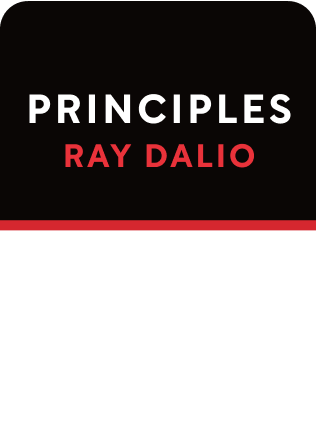

This article is an excerpt from the Shortform summary of "Principles: Life and Work" by Ray Dalio. Shortform has the world's best summaries of books you should be reading.
Like this article? Sign up for a free trial here .
What does overcoming your ego mean? How can overcoming your ego help you succeed at work and in life?
Overcoming your ego is a challenge. But you can learn to overcome your ego using a few select tools.
Learn more about overcoming your ego using the Principles of Life and Work.
Overcoming Your Ego
Problems are painful. Your ego and your desire for comfort get in the way of recognizing problems. Many people are afraid to highlight their weaknesses, and thinking about problems makes them anxious.
To overcome this hesitation, realize what happens if you don’t recognize problems—you’ll set yourself much further back from your goals. While thinking about problems may worry you, not thinking about problems should make you even more worried.
Weaknesses don’t matter if you find solutions for them.
If you want to accomplish great things, you need to push yourself to your limits. If you push yourself to your limits, you will fail a lot. These failures hurt, but the important thing is acknowledging your weaknesses and finding some way to fix them or compensate for them. Unsuccessful people don’t do this.
You need to recognize problems for what they are—opportunities for improvement.
- View life as a game that throws challenges at you that you must struggle with and overcome.
- Acknowledging your problems is not the same as surrendering to them. You will find ways to get around problems.
Think of yourself as a machine, feeding in resources and information, and producing outcomes. Viewing yourself top-down like this helps with objectivity.
- Imagine your air conditioner is broken. Would you tolerate that? Or would you try to find the problems? If you wouldn’t tolerate a broken air conditioner, why should you treat yourself differently?
People who succeed look at themselves unflinchingly. They understand their weaknesses objectively, rather than shying away from them.
As a result of his mistakes, financial and otherwise, Dalio learned that he made the best decisions when he focusing on the idea of “overcoming your ego” relentlessly sought the truth. This meant adopting a number of mindsets: acknowledging his own weaknesses, being open to others’ opinions, constantly asking what he was missing, and stress-testing his ideas.
How Do You Overcome Your Ego?
Don’t fall in the trap of wishing that reality were different. This gets you nowhere.
Instead, embrace your reality and deal with it. You must be radically open-minded to the possibility that you are wrong.
Don’t get hung up on how things ‘should’ be. This will bias your objectivity.
If you think something is morally wrong, assume that you’re wrong and figure out why what nature is doing makes sense.
- For example, picture a pack of hyenas killing a young wildebeest. This feels wrong, but on reflection it’s clear this is good for evolution of the wildebeest and for the total system.
- Nature optimizes for the whole, but people narrowly judge good and bad based on how it affects the individual.
To deal with the emotional pain of finding truth, see life as a game, where the object is to get around a challenge and reach a goal.
What holds a lot of people back from the truth is their ego. Many people’s egos center around being right and looking smart. But everyone is wrong a good portion of the time, and ignoring this is blinding yourself to your mistakes and ways to improve yourself.
Instead of declaring “I’m right,” ask, “How do I know I’m right?” You can’t be sure of anything—there are always risks that can hurt you badly, even in the safest-looking bets. Always assume you’re missing something
Overcoming Your Ego: Barriers to Recognizing Reality
There are two barriers that get in the way of seeing reality: your ego, and your blind spots. Below, we’ll focus on the ego barriers. You need to move past this barrier if you want to work on overcoming your ego.
The Ego Barrier
The ego barrier is your desire to be capable, and to be seen by other people as capable.
We have underlying biological needs to be loved, to feel important, to be praised by others. We also have fears—of losing love, of being irrelevant, of being criticized by others.
Experiences that threaten the ego are painful. Finding out that you had poor judgment and made a huge mistake is painful. Having your weaknesses pointed out to you is painful.
People often find this pain unbearable, and they go out of their way to avoid this pain. They might shut themselves off from self-reflection, or they maintain denial about reality.
Don’t avoid pain—reflect on it and savor it. Pain highlights a learning opportunity that can make you stronger and avoid similar situations in the future.
Seek the Truth
Don’t fall in the trap of wishing that reality were different. This gets you nowhere.
Instead, embrace your reality and deal with it. You must be radically open-minded to the possibility that you are wrong.
Don’t get hung up on how things ‘should’ be. This will bias your objectivity.
If you think something is morally wrong, assume that you’re wrong and figure out why what nature is doing makes sense.
- For example, picture a pack of hyenas killing a young wildebeest. This feels wrong, but on reflection it’s clear this is good for evolution of the wildebeest and for the total system.
- Nature optimizes for the whole, but people narrowly judge good and bad based on how it affects the individual.
To deal with the emotional pain of finding truth, see life as a game, where the object is to get around a challenge and reach a goal.
What holds a lot of people back from the truth is their ego. Many people’s egos center around being right and looking smart. But everyone is wrong a good portion of the time, and ignoring this is blinding yourself to your mistakes and ways to improve yourself. But overcoming your ego is essential for open mindedness and success.
Instead of declaring “I’m right,” ask, “How do I know I’m right?” You can’t be sure of anything—there are always risks that can hurt you badly, even in the safest-looking bets. Always assume you’re missing something

———End of Preview———
Like what you just read? Read the rest of the world's best summary of Ray Dalio's "Principles: Life and Work" at Shortform .
Here's what you'll find in our full Principles: Life and Work summary :
- How Ray Dalio lost it all on bad bets, then rebounded to build the world's largest hedge fund
- The 5-step process to getting anything you want out of life
- Why getting the best results means being relentlessly honest with everyone you work with






